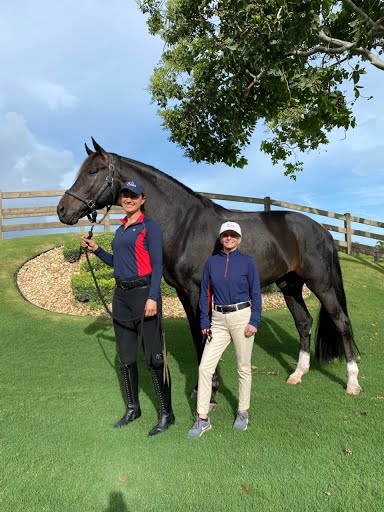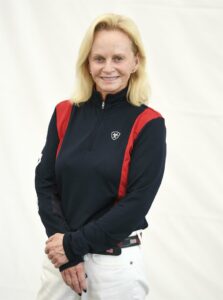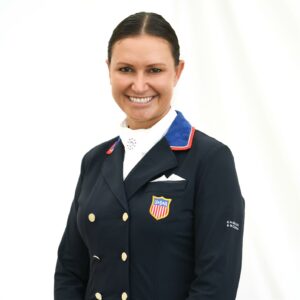
Longtime Valley rider, trainer are headed for the Tokyo Summer Games
By Eric Valentine

It’s one of those sports that didn’t really start as a sport, it just evolved. “Dressage” is French for “training” and, like many fancy French things, the riding techniques associated with it were never just for show. Just as King Louis XIV used ballet to strengthen soldiers and keep his political enemies entertained, dressage—with its nimble and flowing equine maneuvers—got perfected by the Prussian military to make its cavalry the fastest-moving force in the world. So it’s no wonder the Germans have been the perennial favorites and champions of the sport since the 1920s.
And what does all this have to do with the Wood River Valley? It will be two women, both with longtime equestrian ties here, who will be helping Team USA hopefully wrangle at least a few medals out of the German team’s hands when they compete in the dressage events—one as a trainer, one as a rider—at the Tokyo Olympics less than one month from now.
Currently training and living part-time in Wellington, Florida—a sort of mecca for U.S. equestrian facilities and talent—is longtime Hailey resident Debbie McDonald who, since 2018, has been the chef d’équipe (fancy French word for “team leader” or “technical advisor”) for the U.S. Dressage Team. Also there, rider Adrienne Lyle, who moved to the Valley from the Seattle area back in her teenage years to learn under and work for McDonald at River Grove Farm in Sun Valley because, by that time, McDonald was winning accolade after accolade on Peggy and E. Parry Thomas’s chestnut Hanoverian mare named Brentina. The horse-and-rider duo launched onto the international dressage scene 20-plus years ago when they won individual and team gold medals at the 1999 Pan American Games. And in 2003, McDonald became the first American rider to win the Dressage World Cup.
But the pinnacle for McDonald came at the Athens games in 2004 when, atop Brentina, she won the team bronze and finished fourth overall individually. The performance dubbed her the “First Lady of American Dressage.”

All that paved the way for Lyle, who by 2006 started winning numerous Grand Prix-level titles, including the 2008 United States Equestrian Federation Young Adult Brentina Cup. In 2012, she represented the U.S. at the Olympics in London, and in 2014 competed at the Alltech FEI World Equestrian Games in Normandy. In 2018, Lyle was selected to her second World Equestrian Games team with Betsy Juliano’s Hanoverian stallion named Salvino. That year, Lyle and Salvino competed on all three U.S. Dressage Nations Cup teams, helping the U.S. earn gold at FEI Dressage Nations Cup USA, bronze at FEI Dressage Nations Cup The Netherlands, and silver at FEI Dressage Nations Cup Germany.
So how is it that this Valley, known more for competitive skiing, managed to have this level of impact on international dressage? Well, like the sport itself, it was never intended to be that way, it just sort of evolved.
The Walk
Born and raised in Orange County, California, McDonald knew by 14 years of age what she wanted to do in life—to be around horses as much as possible, to ride horses as much as possible, and to do it in as challenging a way as possible. This passion led her to meet an experienced competitive rider in equestrian jumping, which is one of three premier equestrian events (eventing, which combines dressage and jumping with endurance challenges, is the third equine event). That experienced jumper was Bob McDonald, who she would eventually marry and raise a family with.
McDonald excelled at jumping. However, she switched to dressage after a serious fall in which her horse somersaulted over her. She ended up breaking ribs, rupturing her spleen, and fracturing a vertebrae in her neck.
“I was a young mom at the time and the thought of taking another serious fall that could be worse made it too hard to continue,” McDonald said. “I never had quite the same feel for it after that.”
The Trot
That’s when McDonald and her husband Bob met and built a friendship with E. Parry Thomas that would change their lives forever. The McDonalds met Thomas and his wife Peggy when Debbie got a “catch ride” at a dressage show in Las Vegas on one of the Thomases’ horses whose rider was not available. The Thomases owned River Grove Farm in Sun Valley but wintered in Las Vegas and Del Mar, California (the site of the Del Mar Fairgrounds horse racing track).
The friendship and working partnership took off from there, culminating in the prestigious run of championships with Brentina. The Thomases were more than just equestrian enthusiasts (Peggy and their daughter Jane both rode). Their River Grove Farm served as a center for developing competitive horse-and-rider duos for decades. And, the Thomas family has been sponsoring competitors for that same amount of time, including McDonald and Lyle, who also worked as trainers for the Thomases’ ranch.
“Anyone who competes at this level of dressage can’t afford to do it if they’re not excelling as a trainer, too,” McDonald explained.
Thomas, who died in 2016 on his ranch at the age of 95, is credited with financing the development of the Las Vegas casino industry. Not a casino, but the whole concept of what Las Vegas is today. From Wikipedia:
“Edward Parry Thomas (June 29, 1921 – August 26, 2016) was an American banker who helped finance the development of the casino industry of Las Vegas, Nevada. Along with his business partner, Jerome D. Mack, he is credited with building Las Vegas into what it is today.”
Or, as McDonald puts it, “Anyone who lives in the Valley should know about this man and what he accomplished in his life. None of this would be possible were it not for him.”
The Canter
This brings us to 2021, wherein McDonald and Lyle are now preparing to compete in the Summer Olympics, aka the 2020 Tokyo Games, which got postponed until now due to the COVID-19 pandemic. And while the Olympic competition will be as intense as ever, thanks to those German riders and horses (and their Prussian history), who McDonald describes as “kind of unbeatable,” the Olympic experience will be more surreal.
“We’re basically in a bubble the minute we get there,” McDonald said. “I’m sad for the riders that they don’t get to experience what it’s like to take in the city and all the fans. But it’s still such an honor to ride for your country. And when you stop and think about how there are only three horses in the entire United States that earn a spot on the team, it’s really humbling.”
Also humbling will be the Tokyo summer humidity both horse and rider will have to quickly acclimate to once they all deboard their plane (yes, horses fly). McDonald said the Florida humidity will help them avoid any severe shock, but that it still doesn’t compare to what they’ll experience in Japan.
“So much of what makes a horse an elite dressage horse is how well it travels and how comfortable it feels in the new environment once it gets there,” McDonald explained.
And isn’t that true of most journeys—ones you saddle up for or not.


